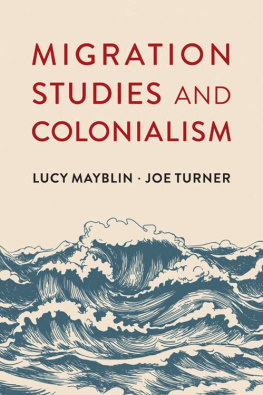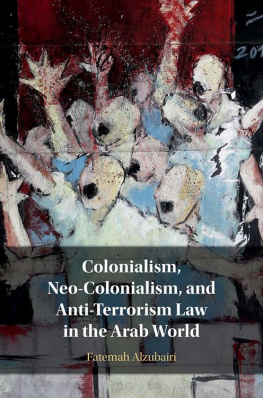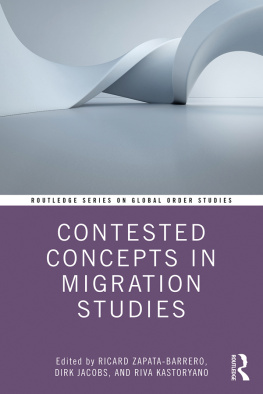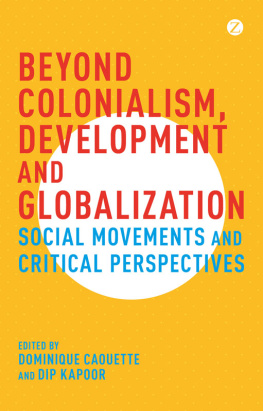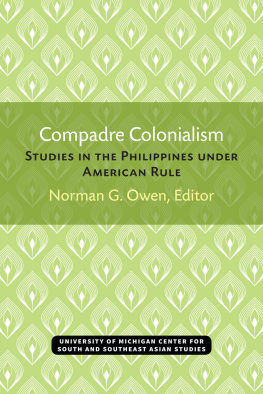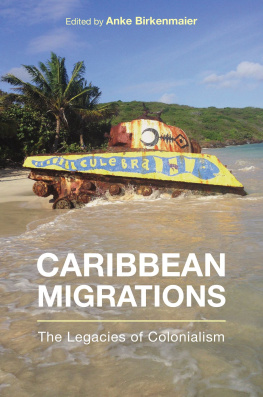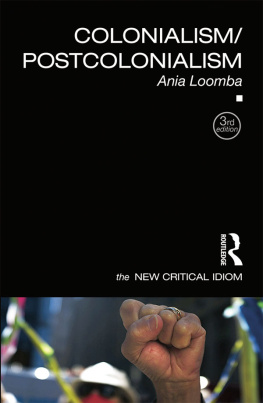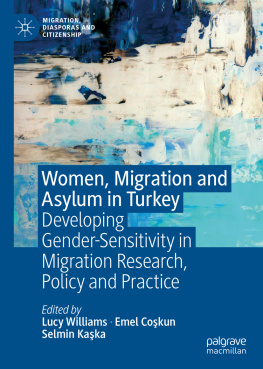Lucy Mayblin - Migration Studies and Colonialism
Here you can read online Lucy Mayblin - Migration Studies and Colonialism full text of the book (entire story) in english for free. Download pdf and epub, get meaning, cover and reviews about this ebook. year: 2020, publisher: Polity Press, genre: Politics. Description of the work, (preface) as well as reviews are available. Best literature library LitArk.com created for fans of good reading and offers a wide selection of genres:
Romance novel
Science fiction
Adventure
Detective
Science
History
Home and family
Prose
Art
Politics
Computer
Non-fiction
Religion
Business
Children
Humor
Choose a favorite category and find really read worthwhile books. Enjoy immersion in the world of imagination, feel the emotions of the characters or learn something new for yourself, make an fascinating discovery.
- Book:Migration Studies and Colonialism
- Author:
- Publisher:Polity Press
- Genre:
- Year:2020
- Rating:4 / 5
- Favourites:Add to favourites
- Your mark:
- 80
- 1
- 2
- 3
- 4
- 5
Migration Studies and Colonialism: summary, description and annotation
We offer to read an annotation, description, summary or preface (depends on what the author of the book "Migration Studies and Colonialism" wrote himself). If you haven't found the necessary information about the book — write in the comments, we will try to find it.
Migration Studies and Colonialism — read online for free the complete book (whole text) full work
Below is the text of the book, divided by pages. System saving the place of the last page read, allows you to conveniently read the book "Migration Studies and Colonialism" online for free, without having to search again every time where you left off. Put a bookmark, and you can go to the page where you finished reading at any time.
Font size:
Interval:
Bookmark:
Lucy Mayblin and Joe Turner
polity
Copyright Lucy Mayblin and Joe Turner 2021
The right of Lucy Mayblin and Joe Turner to be identified as Author of this Work has been asserted in accordance with the UK Copyright, Designs and Patents Act 1988.
First published in 2021 by Polity Press
Polity Press
65 Bridge Street
Cambridge CB2 1UR, UK
Polity Press
101 Station Landing
Suite 300
Medford, MA 02155, USA
All rights reserved. Except for the quotation of short passages for the purpose of criticism and review, no part of this publication may be reproduced, stored in a retrieval system or transmitted, in any form or by any means, electronic, mechanical, photocopying, recording or otherwise, without the prior permission of the publisher.
ISBN-13: 978-1-5095-4293-2
ISBN-13: 978-1-5095-4294-9(pb)
A catalogue record for this book is available from the British Library.
Library of Congress Cataloging-in-Publication Data
Names: Mayblin, Lucy, author. | Turner, Joe B., author.
Title: Migration studies and colonialism / Lucy Mayblin & Joe Turner.
Description: Cambridge, UK ; Medford, MA : Polity Press, [2021] | Includes bibliographical references and index. | Summary: Why colonial histories are crucial to understanding migration today-- Provided by publisher.
Identifiers: LCCN 2020022233 (print) | LCCN 2020022234 (ebook) | ISBN 9781509542932 (hardback) | ISBN 9781509542949 (paperback) | ISBN 9781509542956 (epub)
Subjects: LCSH: Emigration and immigration--Social aspects. | Postcolonialism--Social aspects. | Imperialism--History.
Classification: LCC JV6033 .M39 2021 (print) | LCC JV6033 (ebook) | DDC 304.8--dc23
LC record available at https://lccn.loc.gov/2020022233
LC ebook record available at https://lccn.loc.gov/2020022234
Typeset in 10.5 on 12pt Sabon
by Fakenham Prepress Solutions, Fakenham, Norfolk NR21 8NL
Printed and bound in Great Britian by TJ International Limited
The publisher has used its best endeavours to ensure that the URLs for external websites referred to in this book are correct and active at the time of going to press. However, the publisher has no responsibility for the websites and can make no guarantee that a site will remain live or that the content is or will remain appropriate.
Every effort has been made to trace all copyright holders, but if any have been overlooked the publisher will be pleased to include any necessary credits in any subsequent reprint or edition.
For further information on Polity, visit our website: politybooks.com
We would like to thank Gurminder K. Bhambra, Thom Davies, Katie Bales, Arshad Isakjee, Sara de Jong and Marcia Vera Espinoza for their helpful and constructive feedback and for generously reading parts of/the whole manuscript. Thanks also to the organizers and participants of the Colonial Mobilities workshop at Linneaus University Sweden in summer 2019 for their inspiration, especially Aurora Vergara Figueroa, E. Tendayi Achiume, Peo Hansen , Debbie Samaniego and Gunlog Fur. Thank you to our friends, families and partners for their patience and support whilst we completed the book. Lastly, we remain indebted to the scholarship, social movements and ongoing struggles that shape this book and that we hope we have done justice to.
Recent years have seen much attention, media and political, given to the movement of people. This is especially the case in terms of the extraordinary movements precipitated by war, famine and the ravages of global warming that have produced refugees in seemingly greater numbers. They have also produced hostile responses with the building of walls and fences, the denial of aid and solidarity and changes to citizenship laws which have often turned citizens into migrants to be policed even more harshly. Global crises related to the movement of populations recur with relative regularity, and yet each is presented as unprecedented, reproducing the idea of crisis in the process. This occurs not just in media representations and political debate but also in academic accounts of migration, which often use similar framings in their analyses. In this superb new book, Migration Studies and Colonialism, Lucy Mayblin and Joe Turner contest the idea of the unprecedentedness of the movement of peoples and seek to locate both contemporary migrations and our understandings of migration in the historical contexts that produce them.
Our modern world has been significantly shaped by historical processes and structures that have been in place from the late fifteenth century onwards. These have shaped our institutions and our understandings. We can use the figure of Columbus and his voyages to stand for the beginning of these processes and structures and how they have been understood within Europe. As Locke wrote in the late seventeenth century, in the beginning all the World was America. That is, in their discovery of the Americas, Europeans believed that they were encountering earlier versions of themselves. This laid the groundwork for particular understandings of hierarchies among and between populations across the world. If those peoples encountered by early European travellers were effectively understood as being their ancestors, then Europeans could both show them the (predetermined) future and be unconcerned about their elimination. The first justifies the belief in development; the second suggests that the disappearance of other cultures, peoples, is not a consequence of European actions but a quasi-natural phenomenon.
Columbus, and the Europeans who followed him across the subsequent centuries, are often presented as heroic figures as travellers and pioneers. They are seen to move in what has been called the age of free migration when, apparently, there were no obstacles to movement. Traders, merchants, travellers, mendicants and explorers had long criss-crossed the globe, encountering new cultures, trading with them and learning the ways of others. The population movements from Europe to the New World and beyond coalesced, over four centuries, into a phenomenon that was markedly different from these other quotidian movements and encounters. This is because European movement was linked to colonial settlement which was central to the displacement, dispossession and elimination of populations across the globe. It was also central to the creation of the global inequalities and injustices that mark the worlds we share in common and that are the basis of contemporary movements of peoples. Without understanding the histories that produced these inequalities, we are unlikely to understand contemporary movements.
Taking Columbus, and the Americas, as the beginning is not the same as taking him, or them, as the origin. As Said (1995 [1978]) argues, whereas the idea of origin presupposes that which develops from it, that of a beginning is developed as a complex of connections which allows for construction and reconstruction. Columbus is not the origin of what followed but can be seen as one of the beginnings of the processes and structures that have shaped the modern world. Acknowledging beginnings permits shifts in perspective and understandings of knowledge by taking different points of departure. Events, in this view, are best understood as located in, and constitutive of, particular historical interconnections. Columbus, then, is an event in a world of events which together brought into being our modern world.
Christopher Columbus, born in the Italian city-state of Genoa, patronized by the Spanish Crown of Castile, landed in the islands of what we now know as the Caribbean, searching for a direct route to the treasures of the Indies. His exploratory voyages in the late fifteenth century opened up an entire continent to European populations who travelled in increasing numbers to the New World. Some were in search of adventure, others fleeing poverty, famine, religious persecution and economic disadvantage. Whatever their motives, the decades and centuries subsequent to Columbuss discovery were marked by the subjugation and elimination of indigenous populations and the extraction and appropriation of their resources and land (Dunbar-Ortiz 2014).
Font size:
Interval:
Bookmark:
Similar books «Migration Studies and Colonialism»
Look at similar books to Migration Studies and Colonialism. We have selected literature similar in name and meaning in the hope of providing readers with more options to find new, interesting, not yet read works.
Discussion, reviews of the book Migration Studies and Colonialism and just readers' own opinions. Leave your comments, write what you think about the work, its meaning or the main characters. Specify what exactly you liked and what you didn't like, and why you think so.

